- Home
- J. D. Rhoades
Jack Keller - 01 - The Devil's Right Hand Page 2
Jack Keller - 01 - The Devil's Right Hand Read online
Page 2
He leaned back in the seat and closed his eyes. He saw her in his mind, bent over the keyboard, biting her lower lip like she did when she was concentrating, brushing the long ash-blondhair back from her forehead.
“Got it,” she said. “Crystal Leigh Puryear. Known aliases Amber Dawn.” She paused. “Jesus,” she said. “Amber Dawn? sounds like a feminine hygiene spray.” Keller laughed. “Picked up on a solicitation charge 2 February. Pleaded to disorderly conduct. Last known address—.got a pen?”
Keller fished one out of the glove box. “Shoot.” She gave him the address. “Best bet’s to catch her in the daytime,” she suggested. “Saturday night, date night, you know.”
“Yeah,” Keller said. “Speaking of dating, you thought any about what we were discussing?”
There was a long pause.“Yeah, Keller, I thought about it,” she finally said. “ I like you, you know that, but I don’t think it’s a good idea for me to date someone who works for me.”
Keller thought for a moment. “I quit,” he said.
She laughed. “Nice try,” she said. “But I don’t date unemployed guys, either.”
“Looks like I can’t win,” Keller said.
“Sure you can,” she said. “Just not with me.” Her voice softened. “Get some sleep, Keller,” she said. “And not in the car. Check in somewhere and put it on the company card. Check out the girl tomorrow and find DeWayne Puryear, preferably by his court date next Thursday.”
“Yass, boss,” Keller said.
“Pleasant dreams, cowboy,” she said and hung up.
Keller leaned back and blew a long breath out through his teeth. He shook his head as if to clear it and started the car.
He considered her advice about getting some rest. He was bone-weary, but he knew from experience that sleep wouldn’t come easily. He decided to at least check out the address Angela had given him. Even if no one was there, he could reconnoiter the layout. He had been in this city a number of times before. He had a good idea of where he was headed.
The street was a dead end, lined with small brick houses that had once probably been marketed to young couples in the postwar years as “starter homes.” There were no streetlights. Only a few dim porch lights provided illumination. There was a flickering blue glow of television screens behind the shaded front windows of one or two houses, but most were dark. Keller couldn’t read most of the house numbers from the street. He snapped the headlights off and slowed to a crawl, giving his eyes a chance to get accustomed to the darkness. Finally, he located Crystal Puryear’s address. He parked across the street and rolled down the window.
The house at the end of the street was wooden and looked older than the others, with a more spacious yard and an attached two car garage. A yellow bulb cast a wan glow over the driveway in front of the closed doors of the garage. A picket fence ran between the street and the overgrown yard, ending at the driveway entrance. There was no other light and no sound other than the tick and pop of the cooling engine and the monotonous buzzing of crickets.
Keller sat and looked at the house. One part of his mind automatically mapped out possible approach and escape routes. The other thought about Angela.
She had been right, he mused. Not in her surface excuse about not dating an employee. He could see the real reason when she gently turned him aside from his pursuit of her. She always did so with a soft laugh or a self-deprecating joke about being too old, but the sadness in her eyes told the real story. Too much baggage, her eyes seemed to say. Too much mileage over too many rough roads. And she was right, he thought. For both of them. He leaned his head back and closed his eyes.
Gravel crunched under his boots as he walked away from the looming bulk of the Bradley fighting vehicle. He had always thought of deserts as soft places, cushioned by sand. This place seemed to be mostly crushed rock and tiny pebbles that always managed to work themselves into your boots. All the sand seemed to come to rest in any mechanical or electronic gear. He looked back and cursed the dead GPS receiver inside the Bradley. He had no idea where they were.
“Shit,” he said under his breath. His squad was in the vehicle, most of them asleep. He had to figure out some way to get them home. He unzipped his pants and took a piss on the desert. It summed up his attitude about this place as no other words could.
When he was zipping himself back up, he registered the noise of the rotor blades for the first time. It had to be a Coalition aircraft; the raghead air force had been swept out of the sky weeks ago. He turned towards the sound, waving his arms above his head. “Hey!” he yelled. “Hey…”
There was a ripping sound, like the sky being torn open. A bright white bolt like a lance of flame leaped from out of the darkness and struck the Bradley. The boxy metal shape seemed to bulge outward for a split second before erupting in flame from every opening. The concussion knocked him flat on his back. He lay there for a second, staring stupidly at the sky. He saw metal hatch cover cross his field of vision, whirling across the sky like a UFO. Then he heard the screams. They were burning, but he couldn’t get up. His limbs refused to respond to any command that didn’t involve curling up into a ball. He could hear himself screaming as well. There was another white flash…
He jerked upright in the seat, panting like a distance runner. He flinched as a white tree of lightning arced across the sky, followed by a sharp detonation of thunder. It had started raining again. Keller put both hands on the wheel and waited for his heart to stop pounding. He started the car and drove away.
There was a crowd at the graveside, listening to the preacher’s words with the pinched, stoic expressions of people that had been expecting bad news and soon expected to hear worse. The cemetery was well-tended, bordered by woods on two sides and the small white church on another.
Everyone gave a wide berth to the big man in the brown suit. He stared down into the open grave in silence as the preacher intoned the last few words of the service. A few of them looked at the diamond and ruby rings on his fingers and noted the cut of the expensive suit, but no one made comments, at least in his presence. The man had not been a part of their lives for years, but his reputation for random and vicious fits of temper was still legendary.
When the preacher’s voice trailed off into a nervous mumble, the big man looked up and looked at him. His eyes were hidden by tinted sunglasses, but after a moment, the preacher looked away
and cleared his throat. The big man turned away without a word and walked off towards the line of beat-up cars and trucks in the gravel parking lot. He paused a moment to brush the dust from the cuffs of his pants and opened the door of a large brown 4 x 4 pickup. Letters across the top of the dark-tinted windshield said “INDIAN OUTLAW”.
He got into the truck and sat down, leaving the door open. The truck’s oversized wheels raised the pickup off the ground high enough that the man’s snakeskin boots dangled a few inches from the ground like a child’s in a grownup chair. He waited.
The group at the graveside had broken into smaller knots, discussing the weather, the tobacco crop, and everything except the recently deceased. After a few minutes, a young man detached himself from the congregation and walked over to the truck.
“Hey,” the young man said. There was no reply.
“Any news on who killed Daddy?” the big man said finally. The Lumbee accent made the last word come out as “diddy.”
The younger of the two brothers shuffled his feet in the coarse gravel. “Sheriff said they ain’t got no leads.”
“Shit,” the big man said. He spat on the ground next to his brother’s foot. It was an insult that would have resulted in knives being pulled on anyone else.
“Ain’t no need to get pissed off at me, Raymond.” The younger man whined. “I ain’t…”
“Someone knew Daddy had a lot of cash. Got any idea?”
The younger man shrugged. “I guess the Meskins knew. Daddy paid ‘em off ever’…”
Raymond swung his legs into the truck. “We’ll
go talk to them, then. Get in.”
The younger man looked back at the safety of the crowd. “Get in the truck, John Lee,” Raymond said. “I ain’t gonna tell you again.” John Lee took a last look at the church and sighed. He got in the truck. He slumped unhappily in the seat as Raymond pulled away from the church. “I gotta drop by the club,” Raymond said. “Then we’ll go see what these Meskins can tell us.”
Interstate Highway 95 stretches 1,970 miles, a gray and black river of asphalt that flows from Miami to the Canadian border. Everything moves on the highway. Truckers ferry livestock, produce, cigarettes, clothing, lumber, bricks, cars, anything that can be shipped in a flatbed or trailer. Tourists stare blankly out the windows of cars, motor homes and SUV’s,as they traverse the flat, empty spaces between entertainments. Salesmen study the mile markers for signs that they’ll reach their next meeting in time. And, inevitably, drugs and money move on the highway. The FBI, the DEA, and a variety of local law enforcement try to interdict the tons of cocaine, heroin and marijuana stuffed into the backs of pickups and the wheel wells of compact cars. They catch a few, but mostly they only succeed in angering the African-American and Hispanic drivers that they stop in disproportionate numbers.
Raymond’s club, the 95 Lounge, was visible from the highway, but a curious traveler had to go a mile up to a little-used exit and double back on a narrow country road to reach it. There was little reason for them to; the club was not advertised on any of the thousands of billboards that grew along the roadside. There was no Texaco nearby, no Cracker Barrel restaurant, no McDonald’s or Burger King. The only people who would take the trouble to find their way there were those who knew its real business.
Raymond and John Lee pulled up in the parking lot of the club. It was a low cinder block building painted a dull purple and black. The words “95 LOUNGE” were clumsily hand-painted on the front and side of the building in green and white Day-Glo letters. There were no windows. A neon sign beside the peeling wooden door announced that the 95 Lounge was “open”. There were a couple of battered cars in the parking lot and a new 18-wheel truck.
They entered the club, stopping for a moment to let their eyes get used to the gloom. The only illumination was provided by a dim fluorescent light behind the bar and a Budweiser sign on the far wall. There were several large booths along that wall. A fat man in a polyester shirt with his name embroidered over one pocket was seated in one of the booths. A skinny woman with bleached blonde hair was seated in the booth on the same side. She was whispering something in his ear. As John Lee stared, her hand slid beneath the table and into the fat man’s lap.
“You see somethin’ you interested in?” a voice said.
John Lee turned. Billy Ray, the club’s manager, was standing behind the bar. He had a malicious grin on his broad copper-colored face.
“Darlene’s busy right now, but I don’t reckon that trucker’ll take too long,” Billy Ray said. “You can have sloppy seconds.”
“Shut it, Billy Ray,” Raymond said. “John Lee and me got stuff to do.” The smile disappeared from the man’s face. He sullenly went back to polishing the bar.
John Lee looked back at the couple, who were disappearing out the back door. There was a broken down trailer in the back, he knew. John Lee had never discussed his brother’s businesses with him, but he knew the rumors. It was said that some of Raymond’s female customers were working off their drug debts in that trailer. John Lee swallowed nervously and followed his brother into the office behind the bar.He sat across the desk from Raymond in a rusted straight-backed chair with a tattered cushion. Raymond flicked his desk lamp on. “You got a pistol?” he said to John Lee.
John Lee shook his head. He felt a sick feeling in the pit of his stomach. “Naw,” he said. “I got my deer rifle at home.”
Raymond grunted. He turned his office chair around and fiddled with the large, old-fashioned safe behind his desk. With a click, the black door swung open. Raymond reached in and pulled out a large object wrapped in cloth. He set it on the desk and unwrapped it. John Lee stared down at a huge long-barreled revolver that gleamed in the dim light.
“Raymond,” John Lee said, “What you planning, man?”
“You and me,” Raymond said, “We’re gonna find out who killed our Daddy.”
“The Sheriff—”
“Don’t give two shits about a dead Indian. You know that, and I know that. Anyone goin’ to take care of business, it’s us. Just like Lowrie.”
John Lee, like all Lumbee, knew the name. Henry Berry Lowrie was the Lumbee equivalent of Robin Hood, an outlaw who had taken to the swamps in the 1800’s against the Confederate Home Guard and later against the Federals to avenge the murder of his father and brother and the oppression of the Lumbee by whites.
John Lee couldn’t take his eyes off the pistol. “You think it was them Meskins?”
“I don’t know,” Raymond said. “But I aim to find out. And you’re coming with me.”
“I ain’t never killed nobody before, Raymond.”
Raymond sighed as if this was some admitted failing on his brother’s part. He picked up the gun and stuck it in his waistband.
“Okay,” he said. He reached into the safe again and pulled out another pistol, a stubby, ugly automatic. He pulled back the slide and chambered a round before handing the gun to John Lee. “You take this one and back me up. This is your duty, too, little brother. Now let’s go.”
As they walked back out into the deserted bar, Billy Ray called out to Raymond. “Our friend called,” he said. “Our southern friend.”
Raymond stopped. “What’d he say?”
Billy Ray cast a glance at John Lee. “I told him you were at your Daddy’s funeral. He said to give you his sympathy.”
“Yeah, right,” Raymond said. Paco Suarez didn’t get to be the biggest supplier of cocaine on the East Coast by giving himself over to the softer emotions. “He calls again, tell him I’ll get back to him as soon as I take care of some family business,” Raymond said. “C’mon, John Lee.”
They drove for about thirty minutes, with John Lee providing monosyllabic directions. After they got off the main road, the roads grew narrower, but the scenery never changed. They passed field after field of crops growing thick and fat from the dark rich earth where a shallow sea once rolled. Corn, beans, corn, tobacco, tobacco, beans, tobacco. Houses weathered to the same gray as the topsoil stood among the fields, next to metal tobacco curing barns that gleamed and shimmered in the baking sun. Some landowners had given up the precarious living of farming; those fields grew rows of metal house trailers with postage-stamp-sized dirt yards and old tires thrown up on the roof in a forlorn hope of keeping the roof on in a tornado.
They finally pulled into a narrow dirt driveway that ran between a double line of rusting single-wide trailers. About halfway down the line on the left, there was a break in the regular spacing of the trailers. The soil in the gap
thus created had been denuded of grass and pounded flat by years of trampling. A group of young Latino men sat playing cards at a picnic table under a spreading live oak in the middle of the common area thus created. They looked up warily as the truck pulled up. One of them stood and walked over to the driver’s side window.
“You know who I am?” Raymond said.
The man nodded. He was short and broad, with a dark-brown pockmarked face and a thin Fu Manchu mustache. He looked to be in his mid-forties, in sharp contrast to the other, younger men. He spoke formally, like a man who had learned his English in school rather than on the street. “We were sorry to hear about your father,” he said in his heavy accent.
Raymond looked the man up and down. His eyes flickered to the other men who were beginning to gather around the truck. Still others were coming out of the trailers.
John Lee cleared his throat. “Hey, Raymond,” he said. “Maybe we better—”
“Shut up,” Raymond replied. He turned back to the man by the truck window. “Y’all know anything a
bout who mighta done it?”
“‘Ey, bitch,” one of the men piped up from the crowd. He stepped forward. He was massively built, with ropes of muscles straining the arms and chest of his t-shirt. His arms were covered with elaborate gang tattoos. “We already talk about all this to th’ cops,” the tattooed man said. “Why we got to answer you?”
“I say anything to you, greaseball?” Raymond snapped. There was an angry murmuring from the crowd around the truck and the circle of men tightened. John Lee tried to slide down in the seat.
Raymond made a sudden movement and the long-barreled pistol was in his hand, pointed at the chest of the man by the window. The man flinched slightly, then straightened and looked Raymond in the eye.
“There is no need for this,” he said. He turned slightly, back towards the man who had spoken, and rattled off a long sentence in Spanish. His eyes never left Raymond’s face. There was a high-pitched angry reply. The man by the window responded sharply, then added something with a sly grin. There was a ripple of nervous laughter from the crowd. The tattooed man’s face grew dark with anger, but he turned away and stomped off.
The older man turned back towards Raymond. “I was the one who found your father’s body,” he said. “The rest of the crew,” he gestured at the men around the truck, “Was with me. We always go in together in my truck. No one here killed him, I am sure of it. We all leave work together the night before, and we all go in together the next day.”
“Somebody knew he had a lot of cash on him,” Raymond said.
“That was our pay,” the mustached man said. “We were going to get that money the next day anyway. If one of us stole it, he would be stealing from the rest of us, and from our families back home. No one here would protect him for stealing that.”
Raymond thought that over for a moment, then nodded. “Okay,” he said. “So who else might’ve known about the money?”
The man thought for a moment. “There was a man who came looking for work, “ he said finally. “An Anglo.” He smiled thinly at Raymond. “I didn’t like him.”

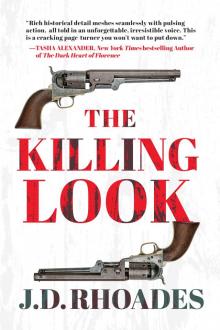 The Killing Look
The Killing Look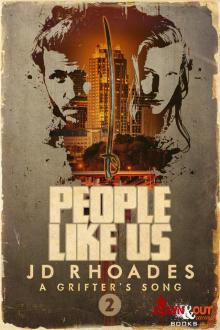 People Like Us
People Like Us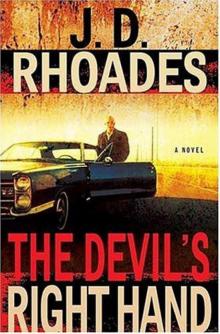 Jack Keller - 01 - The Devil's Right Hand
Jack Keller - 01 - The Devil's Right Hand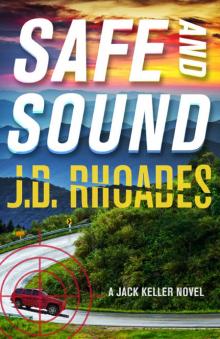 Safe and Sound
Safe and Sound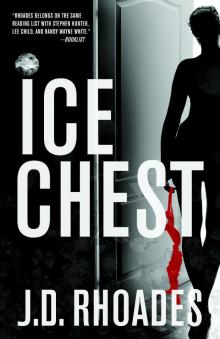 Ice Chest
Ice Chest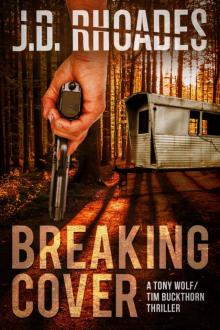 Breaking Cover
Breaking Cover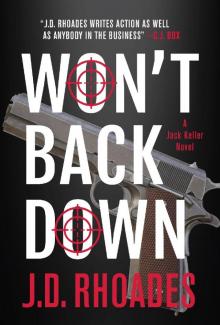 Won't Back Down
Won't Back Down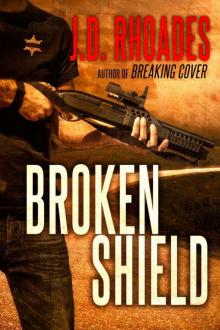 Tony Wolf/Tim Buckthorn - 02 - Broken Shield
Tony Wolf/Tim Buckthorn - 02 - Broken Shield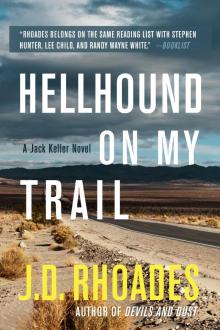 Hellhound On My Trail
Hellhound On My Trail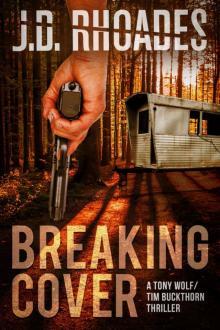 Breaking Cover (Tony Wolf/Tim Buckthorn)
Breaking Cover (Tony Wolf/Tim Buckthorn)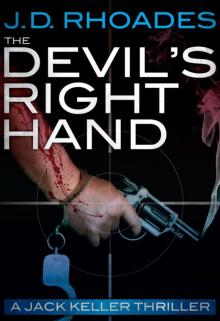 The Devil's Right Hand
The Devil's Right Hand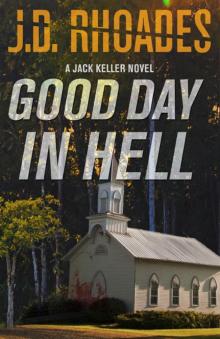 Good Day In Hell
Good Day In Hell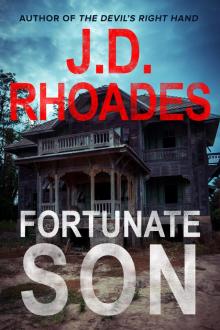 Fortunate Son
Fortunate Son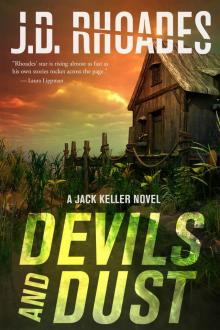 Devils and Dust
Devils and Dust